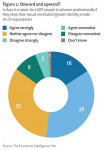Companies expect a more provisional workforce over the next decade, says new research from the Economist Intelligence Unit
There is bound to be cultural friction in a workforce that comprises a larger proportion of contract-based employees. Companies will inevitably strive to earn the loyalty of full-time staff, granting them more resources and opportunity than what is accorded to temporary workers. Workforces will also be increasingly diverse in backgrounds, experience and age. Baby-boomers in developed countries are retiring at an older age than previous generations. Four generations will conceivably work side-by-side in the future workplace.
“The intricacies of managing the future workforce cannot be discounted,” says report editor Gilda Stahl. “Executives will need to assess the needs of competing workforce factions and business imperatives while maintaining morale and company loyalty. It will be an incredible balancing act.”
Other likely features of future workforce organisation identified in the study include the following:
· Localised operations, centralised corporate culture. Companies will continue to localise the management of overseas operations to leverage native managers’ keener cultural understanding of customers and employees. But in a world where cross-border interaction is expected to become more intense, a global outlook will be just as important as local knowledge. While localising management, companies will need a consistent global brand to attract customers and talent.
· Ascendance of soft skills. Companies will focus on building communication skills, cultural awareness and corporate values through international assignments and by bringing together groups of workers from different countries and functions into training sessions. Technical skills, while mandatory, are seen by interviewees for the report as less defining of the successful manager than the ability to work across cultures and build relationships with many different constituents. People who have local knowledge, a global outlook and an intuitive sense of the corporate culture will have the best leadership potential.
· Tapping into the global talent pool. Companies will partner with governments and universities to increase the pipeline of qualified candidates in emerging markets. Social networking tools will also be critical according to interviewees for the report, although a mere 28% of survey respondents say their company will use information technology (IT) and social networking tools for global recruitment over the coming decade.
· Greater diversity. Workers will come from a greater range of backgrounds; those with local knowledge of an emerging market, a global outlook and an intuitive sense of the corporate culture will be particularly valued. Workforces will be larger and spread over more countries, making cross-border communication more important—and more challenging. Most survey respondents see significant cultural and linguistic barriers to hiring globally, and most do not believe their company excels at collaboration.
Global firms in 2020: The next decade of change for organisations and workers is available free of charge at http://www.businessresearch.eiu.com/global-firms-2020.html
Notes for editors
The Economist Intelligence Unit survey was carried out in June-July 2010. The 479 respondents were based mainly in Asia-Pacific (154), North America (139) and Western Europe (137). All major industries were represented. One-half of survey respondents were C-level executives and over 50% of respondents hailed from companies with annual revenue of at least US$500m.
The white paper is based on the results of the survey. In addition, the Economist Intelligence Unit interviewed 15 senior executives and industry experts on how they foresee the future global firm in terms of organisational structure and workforce management. The insights from these interviews appear throughout the report.
About the Economist Intelligence Unit
The Economist Intelligence Unit is the world leader in global business intelligence. It is the business–to–business arm of The Economist Group, which publishes The Economist newspaper. As the world's leading provider of country intelligence, the Economist Intelligence Unit helps executives make better business decisions by providing timely, reliable and impartial analysis on worldwide market trends and business strategies. More information about the Economist Intelligence Unit can be found at www.eiu.com or follow us on www.twitter.com/theeiu
웹사이트: http://www.eiu.com
연락처
Joanne McKenna
Press Liaison
+44 (0)20 7576 8188
이메일 보내기
이 보도자료는 Economist Intelligence Unit가(이) 작성해 뉴스와이어 서비스를 통해 배포한 뉴스입니다.




